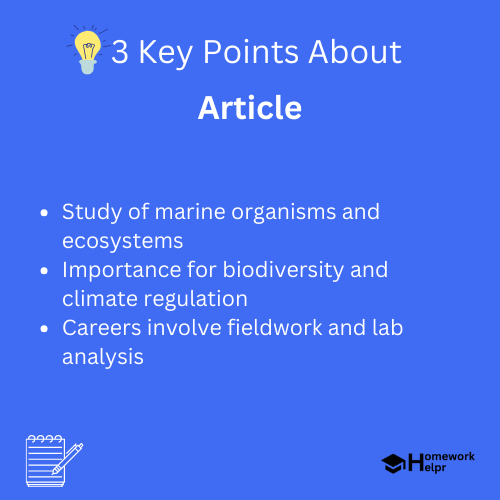📝 Summary
Marine biology is a captivating field focusing on marine organisms and their ecosystems. It studies diverse life forms in the ocean, crucial for maintaining biodiversity and global climate regulation. Marine biologists examine interactions among organisms and their environments, addressing challenges like pollution and overfishing. Understanding this intricate field enables better conservation efforts to protect vulnerable species and ecosystems. Notably, the ocean remains largely unexplored, hinting at countless undiscovered species. The balance of life within marine ecosystems is vital for the health of our planet and future generations.
The Fascinating World of Marine Biology
Marine biology is a captivating field of science that focuses on the study of marine organisms and their ecosystems. The ocean, which covers over 70% of our planet’s surface, is home to a diverse array of life forms, ranging from tiny plankton to the massive blue whale. Understanding this complex environment helps us appreciate the intricate balance of life and the profound impact humans have on these systems.
What is Marine Biology?
Marine biology is a branch of biological sciences that investigates the organisms that inhabit the oceans and their interactions with one another and their environment. It encompasses various disciplines, including ecology, taxonomy, and physiology. Marine biologists study both the living organisms and the non-living components of the ocean, seeking to understand how they function together.
Definition
- Taxonomy: The science of naming, describing, and classifying organisms.
- Ecology: The study of interactions between organisms and their environment.
- Physiology: The branch of biology that deals with the functions and processes of living organisms.
Types of Marine Organisms
Marine organisms can be classified into two main groups: plankton and nekton.
- Plankton: These are microscopic organisms that drift in the water column. They can be further categorized into zooplankton (animal plankton) and phytoplankton (plant-like plankton).
- Nekton: These are larger aquatic animals that can swim against currents, such as fish, dolphins, and whales.
Organisms may also be divided based on their habitat. In this context, we have:
- Benthic organisms: Those living on or near the seabed.
- Pelagic organisms: Creatures that inhabit the open water column.
Importance of Marine Biology
Understanding marine biology is crucial for several reasons:
- It helps us maintain biodiversity, which is essential for ecosystem stability.
- Marine organisms play a critical role in global climate regulation.
- Many marine species are sources of food, medicine, and income for communities worldwide.
In addition to these reasons, marine biology also aids in conservation efforts. By studying the effects of human activity, such as pollution and overfishing, we can develop strategies to protect vulnerable species and ecosystems.
Fascinating Marine Ecosystems
Marine ecosystems are diverse and include several types, each with its unique characteristics:
- Coral Reefs: Often referred to as the “rainforests of the sea,” these vibrant ecosystems are home to numerous marine species.
- Open Ocean: A vast and largely unexplored area that supports various species, including sharks and migratory fish.
- Estuaries: Where fresh water from rivers meets the ocean, these areas are rich in nutrients and serve as crucial breeding grounds for many species.

Studying Marine Biology
A career in marine biology can be incredibly rewarding. It typically involves higher education in biological sciences, geology, and chemistry. Marine biologists often engage in fieldwork, studying organisms in their natural habitats, and working in laboratories to analyze data.
❓Did You Know?
Did you know that about 90% of the ocean is still unexplored? There are likely countless marine species we have yet to discover!
Challenges Facing Marine Biology
Despite its significance, marine biology faces numerous challenges:
- Climate Change: Rising temperatures and ocean acidification threaten marine life, altering habitats and species distribution.
- Pollution: Plastics and chemicals in the ocean are toxic to marine organisms and disrupt ecosystems.
- Overfishing: This practice depletes fish stocks and disrupts the food chain, threatening many species with extinction.
Examples of Marine Species
Here are some remarkable marine species worth mentioning:
- Blue Whale: The largest animal on Earth, reaching lengths of up to 100 feet.
- Sea Turtles: These ancient reptiles have been around for over 100 million years and play an essential role in marine ecosystems.
- Giant Squid: A creature of the deep, the giant squid is known for its size and elusive nature.
Examples
- The blue whale feeds primarily on krill, small shrimp-like creatures, consuming up to 4 tons daily!
- Loggerhead sea turtles migrate thousands of miles each year, often returning to the same beach where they were born to lay eggs.
Conclusion
Marine biology is an exciting and essential field of study that reveals the wonders of the ocean and the life it supports. From the smallest plankton to the largest whales, every organism plays a role in maintaining the balance of life in marine ecosystems. As stewards of our planet, it is vital that we understand and protect these environments, ensuring the longevity of the incredible diversity they harbor. By fostering a deeper understanding of marine biology, we can contribute to the responsible management and conservation of our oceans for future generations.
Related Questions on Article
What is marine biology?
Answer: Marine biology studies marine organisms and ecosystems.
Why is marine biology important?
Answer: It helps maintain biodiversity and climate regulation.
What challenges does marine biology face?
Answer: Challenges include climate change, pollution, and overfishing.
What careers are available in marine biology?
Answer: Careers typically involve biological sciences and fieldwork.
